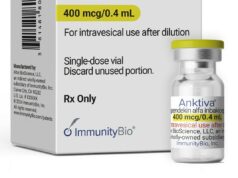
Preliminary data from an early-stage clinical trial show that heavily pretreated metastatic colorectal cancer patients receiving an off-the-shelf CAR-T cell therapy with chemotherapy achieved responses without some of the serious side effects that have been a concern with CAR-Ts, including off-the-shelf ones.
Mont-Saint-Guibert, Belgium-based Celyad said Friday that it had presented the data on CYAD-101 in patients with mCRC at the European Society for Medical Oncology World Congress on Gastrointestinal Cancer conference in Barcelona. CYAD-101 is allogeneic, meaning it is made from T cells from healthy donors. The company also presented preliminary Phase I data on CYAD-01, an autologous CAR-T in the same disease made from patients’ own cells.
Among six patients receiving CYAD-101 at two dose levels concurrently with the chemotherapy combination FOLFOX, one achieved a partial response after three months, while three achieved stable disease. At the same time, there were no reports of cytokine release syndrome and no evidence of graft-versus-host disease. GvHD, a common occurrence with allogeneic stem cell transplant that has been seen in the past with allogeneic CAR-Ts, is when the body’s immune system treats the donated bone marrow or cells as foreign and attacks them.
Meanwhile, in the CYAD-01 study, one patient had a partial response, and six had stable disease. There were no cases of Grade 2 or higher CRS.
In a phone interview, David Gilham, Celyad’s vice president of research and development, said it is not surprising that CRS would not be as much of a concern as it is with CAR-Ts in blood cancers because with solid tumors, the disease is much more localized. When the modified T cells reach the tumor, they release a large amount of proteins known as cytokines to attack it. But whereas this happens systemically in blood cancers, it only happens locally in solid tumors.
“The challenge is that these tumors are buried away more in tissue, which makes getting to them harder,” Gilham said. “And that means CRS is likely to occur because of the kinetics of the T cells and where the tumor sits in the tissue.”
With respect to efficacy, Gilham cautioned that the data are preliminary, but noted that patients as heavily pretreated as those in the two studies have few treatment options and ordinarily do not respond. He pointed to historical data showing about an 8 percent partial response rate and stable disease in the 30-40 percent range.
Dr. Richard Kim, a gastrointestinal cancer specialist at the Moffitt Cancer Center in Tampa, Florida, also noted that it was tough to draw any conclusions from such a small number of patients. “But the trial just demonstrated that it is feasible to combine it with chemo,” he wrote in an email.
The CYAD-101 study is taking place at three centers in Belgium and two in the U.K., while the CYAD-01 study is at three centers in Belgium and two in the U.S., including Moffitt.
One finding in the study was that compared with the autologous CYAD-01 cells, CYAD-101 resulted in better engraftment – acceptance of transplanted cells – at similar dose levels. Compared with autologous cells from very sick patients, the allogeneic cells came from healthy donors, which could thus make them more powerful. “Basically, the premise is that if we use a bank of healthy donor cells, then they’ll have more potency and ability to engraft because they’re from a younger, healthier person,” Gilham said.
Two CAR-T cell therapies, both autologous, currently have Food and Drug Administration approval: Novartis’ Kymriah (tisagenlecleucel) and Gilead Sciences’ Yescarta (axicabtagene ciloleucel). Yescarta is approved for diffuse large B-cell lymphoma, while Kymriah is approved for both DLBCL and pediatric acute lymphoblastic leukemia.
Photo: nopparit, Getty Images








